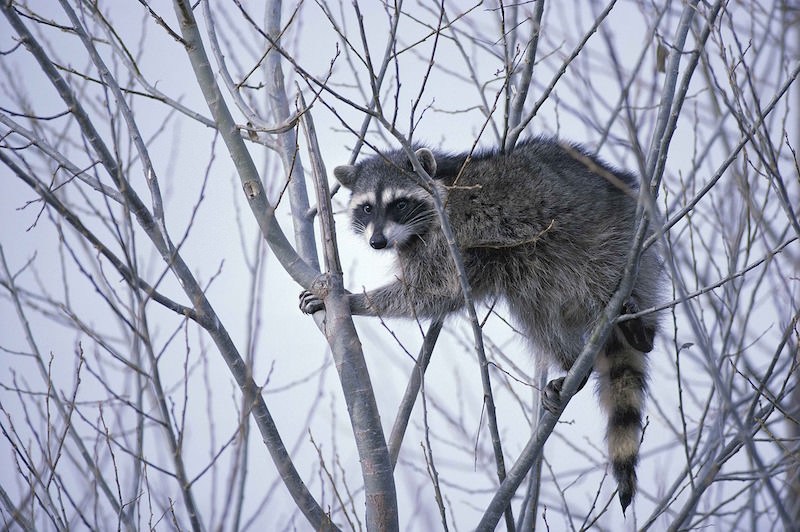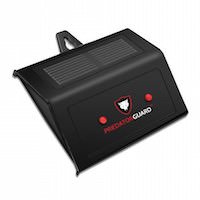Using Raccoon Repellents and Deterrents

By Craig Basset, Expert Reviewer for Repellent Guide
published: Feb 05, 2018 | updated: Feb 08, 2018
To homeowners worldwide, finding effective raccoon repellents and deterrents would be like manna from the heavens. Those little creatures are a real handful for even the most savvy of home owners. Raccoons are intelligent creatures that see a home as an ideal opportunity to set up shop, to establish their den on your premises. As raccoons find their natural environment shrinking daily, their interaction with humans increases. They have adapted to sharing their environment with humans. When they take up residence in your home, destroy your garden, or rummage through your trash cans remember that they are just looking for food or a place to live - they don't deserve to be killed for such actions. It's always important for homeowners to also remember that they are creatures just doing their best to survive too. Therefore some education, understanding and compassion goes a long way and serves as an important key in the battle with raccoons. There are numerous ways to prevent raccoons from being pests without exterminating them. This article sheds some light on effective raccoon repellents and deterrents to keep those pesky creatures at bay.
The raccoon problem is on the rise and is becoming a real plague. More and more often one meets the masked intruder in home gardens, on terraces and balconies. They leave a trail of destruction - devastated flowerbeds, garbage cans and even a threat to your pets. Suitable protective measures are therefore becoming increasingly important. They able to come through cat flaps and open doors often to the house. Often the animals reach about trees on the attics of houses, destroying as the roof insulation or cause solely through feces and urine damage that may lie in the amount of several thousand euros per house. The nocturnal pests are now also widespread among us. The best way is to get rid of it to make them as uncomfortable as possible from the outset. Homeowners need to be patient and flexible in the ways they choose to deal with these creatures. It's a case of trial, error and more testing till you find the most effective ways that produce the best results for you and your family.
Preventive measures against raccoons
It is better to make the house and garden for the animals as unattractive as possible, so that they do not even think about settling there. You should follow several simple rules. So it is always recommended to always ensure that compost and trash cans are all tightly closed. Garbage is one of the most valuable food sources for raccoons. Place garbage in a bin that can be fastened shut so that the rodents can’t get to the food inside. Even on short-term storage of a large variety rubbish in the garden or terrace and balcony, such as bulky waste or building material as possible should be abandoned. Any type of suitable shelter affords raccoons the opportunity to set up a night's lodging. Even garden sheds, garages, abandoned buildings, attics and flues are high on the list of the most desirable sleeping and throwing seats.
Raccoons are notorious for dumping garbage cans over and helping themselves to a free meal leaving behind a yard full of garbage. To prevent this, use a bungee cord or ratchet strap to secure the lid on your garbage can.
Thus, the small predators find a way into your home, should branches of trees, where the animals could get into the house, be trimmed. Cirrus and creepers on walls provide optimum grip, so raccoons can climb it. It should therefore dispense as possible on facade greening. If the raccoon has managed only once to climb up on the wall, it looks likes a loophole in the roof to enter the house. Therefore, you should periodically the house roof for vulnerabilities, such as displaced brick check and repair the appropriate places equal.
If you do an online search, you will find all sorts of raccoon repellants sold, many with confident money-back guarantees. Most of them are made of mothballs. In fact, most animal repellents sold are made from either mothballs or coyote urine. Some people may also recommend the use of bright lights, strobing lights, or noises. The most common noise deterrents are regular radios and ultrasonic high-pitch sound emitting devices.
Using Water
Using a motion activated sprinkler is a terrific way to scare off unwanted raccoons from your flower bed, freshly installed sod or garbage can. They're easy to use, environmentally friendly and they can be used to repel a variety of different animals. Sprinklers work well because you don't have to worry about smelly odors or reapplying the scent after it rains. With a sprinkler you can set it and forget it.

Because raccoons are typically nocturnal and only come out at night, purchase a water timer and set the timer from dusk to dawn. One downfall to the sprinkler is their limited range. Unless you buy several, you wont be able to cover your whole lawn. They work best for specific areas like a garden, flower bed or areas surrounding the garbage cans.
Mint-X bags are specifically designed to repel raccoons. All natural, mint scented fragrance – which raccoons dislike – is added to the bags. Repellents and deterrents are a must to fight the trouble with raccoons. It helps to use effective deterrents like motion activated floodlight or repellents like motion activated audio repellent and motion activated sprinkler as great means to keep raccoons away.
Repellent moth balls are also very effective in the battle against raccoons. Mothballs produce an odor raccoons absolutely hate and will strive to avoid. Many people use balls of naphtha outside or inside their trashcans as a preventative measure against raccoons. Mothballs are often used by homeowners to get rid of raccoons in attic or crawlspaces. However, if mothballs are left in such places, these chemicals can seep into the rest of your house exposing people living there. What’s more mothballs can be ingested by pets or even small children.
Homemade Raccoon Repellent
Ammonia - One of the most practical ways is to take a small dish, fill it with ammonia and place a rag in the dish. The smell of the ammonia repels the raccoon and the rag acts as a wick to help disperse the smell. Once the dish runs dry simply add more ammonia. This method works great in limited spaces like attics, chimneys and garbage cans where the lack of air flow concentrates the smell.

Hot Pepper Solution - Take one can of cayenne pepper or one small bottle of Tobasco sauce and mix it with one gallon of water. Add one teaspoon of dish soap which will help the solution adhere to the plants or item you spay it on. Place the mixture in a spray bottle or pump sprayer and spray the area you want to protect. To be effective, you need to respray the area after a hard rain or once every 3 or 4 days.
You may ask - what is the best raccoon repellent?
When it comes to raccoon repellents, it is better to choose natural products that are safe for use around the house especially if you have kids and household pets. We suggest using the following option:
Critter Ridder by Havahart
It’s effective raccoon repellent with all natural organic formula that is effectively used to keep raccoons away from your property costing only $16.05: The product consists of all natural ingredients including piperine, capsaicin and black pepper. How it works: This irritation sensation sends raccoons running. After a couple of visits, raccoons associate it with your garden and learn to just stay away.
It's not just enough to remove raccoons from your home and then repair the entry points. That's not a viable raccoon repellent. Unfortunately it's the fatal flaw that most homeowners are making. Here's why. Besides the fact that in almost every case, these critters leave behind horrid disease carrying parasites like raccoon roundworm in their droppings. Both male and female do this all over attic areas and beyond. The scenario occurs as male raccoons scent posting attracts female raccoons and of course, vice versa, the female's posting attract the males.
To worsen the situation, is the fact that scent posting can also attract opossums and other critters who are looking for a safe place to nest. For that opossum there is no safer place than close to a raccoon. They are safe from any predators, because the raccoon won't let the predator in the nesting place. Without the elimination of these postings, it is a virtual certainty that raccoons and other animals will scratch, claw and gnaw their way back into your home because they smell the scent in there. Once the scent posting is gone, the motivation for the animals entering your home is gone as well. Once you get rid of the scent from your attic and other at risk areas around the house, then and only then would you focus on repairing the entry points. Otherwise they are just going to keep getting ripped open again.
-
-
Spray



